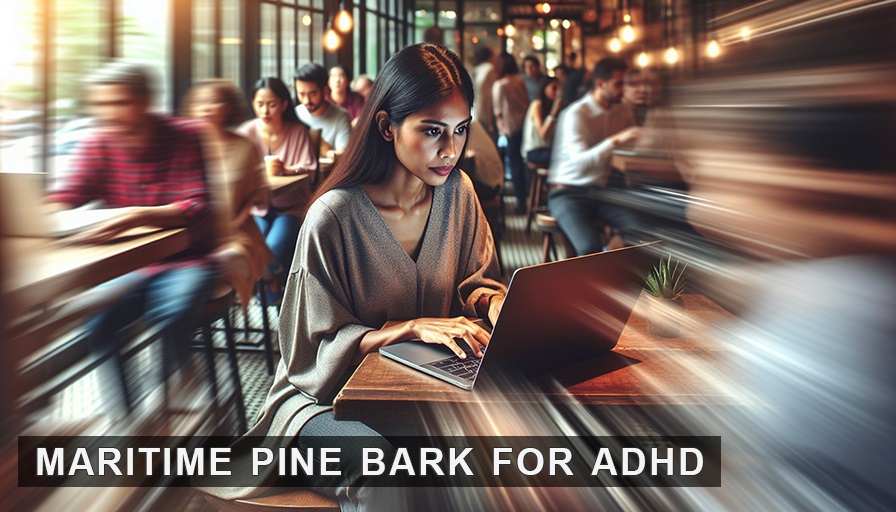
Maritime Pine Bark extract, often sold under the trademark name Pycnogenol, is a plant-based supplement that has been making waves in the ADHD community. Derived from the bark of the French maritime pine tree, this extract contains a complex mix of antioxidant compounds called procyanidins. Advocates claim it can improve focus, reduce hyperactivity, and even help regulate stress hormones. But how well do these claims hold up when compared to the scientific evidence? The truth is both promising and cautious.
Contents
Why Maritime Pine Bark Attracts Interest
Pycnogenol is rich in bioflavonoids with antioxidant and anti-inflammatory properties. Because oxidative stress and inflammation have been implicated in ADHD, researchers wondered whether reducing these processes might improve symptoms. There is also some evidence that Pycnogenol may influence nitric oxide levels, which could improve blood flow to the brain, and might impact catecholamine balance, the system involved in focus and attention. These mechanisms sound compelling, but science requires more than a good theory.
Research Evidence: Small but Intriguing
Several small randomized controlled trials (RCTs) have examined Pycnogenol for ADHD. While results are encouraging, they are not yet conclusive. Here are the main findings:
The Slovakian Study
One of the most cited studies was published in 2006, involving 61 children with ADHD. The group that received Pycnogenol showed significant improvements in hyperactivity and attention compared to placebo after one month. Teachers and parents reported better classroom behavior and emotional regulation. However, the benefits seemed to fade once supplementation stopped, suggesting ongoing use may be necessary. The small sample size and limited duration also mean the findings should be interpreted cautiously.
Other Small Trials
Follow-up studies with fewer participants have reported similar results, showing improvements in oxidative stress markers, attention, and behavior. Some trials also observed reductions in cortisol levels, the stress hormone often elevated in ADHD. These biological findings add plausibility to the behavioral improvements, but again, most trials were short-term and underpowered.
Systematic Reviews
Systematic reviews of Pycnogenol note that while initial data is positive, the quality of evidence is low due to small sample sizes, methodological limitations, and lack of replication. The U.S. National Center for Complementary and Integrative Health (NCCIH) highlights this uncertainty, urging caution until larger, well-designed trials are conducted.
Clinicians’ Perspectives
Practitioners who work with ADHD patients sometimes recommend Pycnogenol as a complementary approach. Reports from clinics suggest some children show meaningful behavioral improvements, particularly in hyperactivity and impulsivity. Others do not respond at all, underlining the variability of outcomes. Clinicians emphasize that it should not replace standard treatments but may be worth considering in cases where families seek additional support or prefer a more natural adjunct to medication and behavioral therapy.
Some clinicians also point out that parents often notice improvements in sleep quality and mood regulation when their children take Pycnogenol. These secondary effects, while less studied, could indirectly benefit ADHD management. Still, the lack of large-scale data makes it hard to predict who will respond and to what degree.
Dosing and Safety
Most ADHD studies have used doses of around 1 mg per kilogram of body weight daily, which translates to roughly 30–60 mg for children. Supplements on the market typically range from 50 to 150 mg per day for adults. Pycnogenol is generally considered safe, with few reported side effects. Some individuals may experience mild gastrointestinal discomfort, dizziness, or headaches. Because it may affect blood clotting, people on anticoagulant medications should consult a healthcare professional before use.
It’s also important to note that Pycnogenol is a trademarked extract. While other pine bark extracts exist, their composition and potency may differ. Choosing standardized products is key for consistency and safety.
Where Mind Lab Pro Fits
Mind Lab Pro includes Maritime Pine Bark extract in its formula. The inclusion is designed to support antioxidant defenses and circulation, which may contribute to clearer thinking and mental energy. For people curious about Pycnogenol but not wanting to take it as a standalone supplement, this provides a convenient option. As always, expectations should remain measured: it may provide incremental benefits, but it is not a cure for ADHD.
Practical Checklist
- Understand the evidence: small trials suggest benefit, but results are not conclusive.
- Check product quality: standardized extracts ensure better consistency.
- Work with a clinician: especially important for children or if taking medications that affect blood clotting.
- Track changes: improvements may be subtle and easier to spot with a journal or feedback from teachers.
- Think long-term: benefits may fade if supplementation is stopped, so sustained use may be necessary for some people.
Key Takeaways
Maritime Pine Bark extract (Pycnogenol) offers intriguing but preliminary evidence for ADHD. Small trials suggest improvements in hyperactivity, attention, and stress regulation, but larger studies are needed to confirm these results. Clinicians see mixed responses, with some patients benefiting more than others. The supplement appears safe for most people, but should be used thoughtfully and not as a replacement for standard treatments. Included in formulas like Mind Lab Pro, it may serve as one piece of a broader strategy for brain health and attention support.

